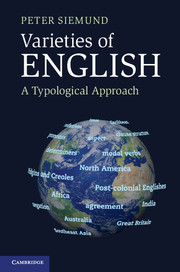Book contents
- Frontmatter
- Contents
- List of figures
- List of tables
- Acknowledgements
- How to use this book
- Abbreviations
- 1 Introduction
- 2 Reflexivity and reflexive marking
- 3 Pronominal gender
- 4 Pronominal case
- 5 Determiners
- 6 Tense marking
- 7 Aspect marking
- 8 Modal verbs
- 9 Negation
- 10 Subject-verb agreement
- 11 Ditransitive constructions
- 12 Interrogative constructions
- 13 The formation of relative clauses
- 14 Summary and outlook
- General references
- Index of languages, varieties, and areas
- Index of names
- Subject index
- References
10 - Subject-verb agreement
Published online by Cambridge University Press: 05 May 2013
- Frontmatter
- Contents
- List of figures
- List of tables
- Acknowledgements
- How to use this book
- Abbreviations
- 1 Introduction
- 2 Reflexivity and reflexive marking
- 3 Pronominal gender
- 4 Pronominal case
- 5 Determiners
- 6 Tense marking
- 7 Aspect marking
- 8 Modal verbs
- 9 Negation
- 10 Subject-verb agreement
- 11 Ditransitive constructions
- 12 Interrogative constructions
- 13 The formation of relative clauses
- 14 Summary and outlook
- General references
- Index of languages, varieties, and areas
- Index of names
- Subject index
- References
Summary
Agreement can be defined as a relationship of covariance between two or more sentential elements, as, for example, between subject and verb. In such a relationship, one element serves as the controller of the agreement relation, and one or more of the other sentential elements can be identified as the targets by virtue of some formal exponence that would not appear without this relationship. Handbooks of English usually agree that English has agreement between subject and verb at least in terms of person and number: I leave, he leave-s, the house stand-s here, the houses stand here. This agreement relation is only marked in the third person singular (non-past) by means of the suffix -s. We encountered another agreement relation in Chapter 3 in our discussion of systems of pronominal gender. Demonstrative pronouns show number agreement with their nominal heads (Chapter 5). Negative concord, as introduced in Chapter 9, may also be viewed as an agreement relation, though not a typical one. In the present chapter, we will be exclusively concerned with subject-verb agreement.
Overview
In his monograph on agreement, Corbett (2006: 1) begins his exposition by introducing a clearly false hypothesis – for didactic reasons, of course. According to this hypothesis, ‘grammatical information will be found only together with the lexical item to which it is relevant’. Corbett continues by stating that ‘[t]his hypothesis suggests a situation which is iconic, functional, sensible and understandable’. By way of illustration, he introduces English plural marking (dog/dogs) and the marking of the past tense (compute/computed), which fulfil the above criteria. Subject-verb agreement, and agreement in general, blatantly violates such a commonsensical perception of language as that which lies behind the above hypothesis. The main ‘problem’ of agreement is that it expresses information originating in another constituent. The verbal third person -s suffix of standard English mirrors information on the subject constituent.
- Type
- Chapter
- Information
- Varieties of EnglishA Typological Approach, pp. 195 - 218Publisher: Cambridge University PressPrint publication year: 2013

